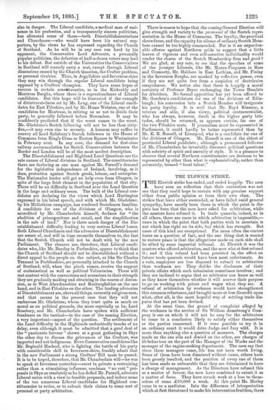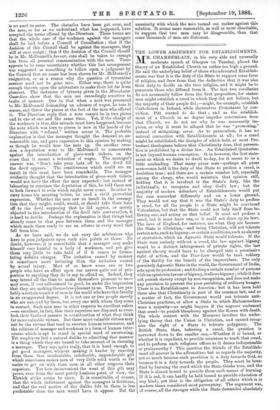THE ELSWICK STRIKE.
THE Elswick strike has ended, and ended happily. The men have seen on reflection that their contention was not one that they could hope to sustain with any genuine support either from public opinion or from their own class. The strikes that have either succeeded, or have failed amid general sympathy, have mostly been those in which the point in dis- pute has been that the men have asked for arbitration, while the masters have refused it. In trade quarrels, indeed, as in all others, there are cases in which arbitration is impossible,— cases in which the point that both parties wish to ascertain is not which has right on its side, but which has strength. But cases of this kind are exceptional. Far more often the contest turns on a question of fact, and the one thing that is wanted to restore peace is that the allegations made on each aide shall be sifted by some impartial tribunal. At Elswick it was the masters who offered arbitration, and the men who at first refused it ; and if this refusal had been persisted in, the effect on future trade quarrels would have been most unfortunate. As a rule, employers are less disposed to submit to arbitration than workmen are. They dislike the disclosure of their private affairs which such submission sometimes involves ; and they are inclined to argue that no arbitrator can know as well as they know themselves whether it will answer their purpose to go on working with prices and wages what they are. A refusal of arbitration by workmen would have strengthened this common reluctance, and brought more or less discredit upon what, after all, is the most hopeful way of settling trade dis- putes that has yet been devised.
At the same time, the ground of complaint alleged by the workmen in the service of Sir William Armstrong's Com- pany is one on which it will not be easy for the arbitrators to come to a conclusion likely to satisfy either themselves or the parties concerned. If it were possible to try it in an ordinary court it would drive Judge and Jury wild. It is more than anything else a question of manners. The charges made on the one side and denied on the other, are charges of ill-behaviour on the part of the Manager of the Works and the manager of the engine-making department. The men say that since these managers came, life has not been worth living. Some of them have been dismissed without cause, others have been grossly insulted, and the position of every one of them has been made so unbearable that they are determined to have a change of management. As the Directors have refused this as a matter of favour, the men have combined to extort it as a matter of force. They have struck work at a loss to them- selves of some £10,000 a week. At this point Mr. Morley came in as a mediator. Into the difference of interpretation which at first threatened to make his intervention fruitless, there is no need to enter. The obstacles have been got over, and the men, so far as we understand what has happened, accepted the terms offered by the Directors. These terms are that the whole case of the workmen against the managers shall be laid before a Council of Conciliation ; that if the decision of this Council shall be against the managers, they will at once resign ; that if the decision of the Council should be in Mr. McDonnell's favour, care shall be taken to exempt him from all personal communication with the men. There appears to be some uncertainty whether this last arrangement was suggested as something to follow upon a judgment by the Council that no cause has been shown for Mr. McDonnell's resignation, or as a reason why the question of tyrannical manner need not be gone into. Either way, there is quite enough thrown upon the arbitrators to make their lot far from pleasant. The instances of tyranny given in the Manchester Guardian show that the men are exceedingly sensitive to faults of manner. One is, that when a note was presented to Mr. McDonnell demanding an advance of wages, he tore it aCT088, and threw the pieces at the feet of the man who offered it. The Directors reply that a note cannot be in two pieces and in one at one and the same time. Yet, if the charge of the workmen is true, this miracle must have happened, because the note which was torn to pieces is now in the hands of the Directors with " refused " written across it. The probable explanation is that the manager thought the demand an un- reasonable one, and gave expression to this opinion by making as though he would tear the note up. On another occa- sion a deputation went to Mr. McDonnell to remonstrate against the introduction of piece-work tickets, on the score that it meant a reduction of wages. The manager's answer was, "Don't take your hats off to the devil till the devil appears." The sensitiveness which could see an insult in this must have been remarkable. The manager evidently thought that the introduction of piece-work tickets would not have the effect the men expected ; but instead of labouring to convince the deputation of this, he told them not to look forward to evils which might never come. In order to carry home his meaning better, he used a vivid proverbial expression. Whether the men saw an insult in the assump- tion that they might, could, would, or should take their hats off to the devil supposing that he did appear, or merely objected to the introduction of the devil into conversation, it is hard to decide. Perhaps the explanation is that things had already come to that pass between them and the manager which made them ready to see an offence in every word that fell from him.
As we have said, we do not envy the arbitrators who have to pass judgment upon such nice points as those. No doubt, however, it is conceivable that a manager may make himself very hateful to a body of workmen, and yet give them very little to take hold of if it comes to formu- lating definite charges. The irritation caused by manner is sometimes more irritating than the irritation caused by actual injury. Most of us know some one or two people who have an effect upon our nerves quite out of pro- portion to anything they do or say to offend us. Indeed, they may intend all the time to make themselves pleasant to m- any even, if our self-control be good, be under the impression that they are making themselves pleasant to us. There are pro- bably a certain numbar of men in the world who have this faculty in an exaggerated degree. It is not one or two people merely who are annoyed by them, but every one with whom they come in contact. Such men may in other respects be excellent rulers —so excellent, in fact, that their superiors are disposed to over- look their faults of manner in consideration of what they think far more valuable virtues. But these more valuable virtues may not be the virtues that tend to sweeten human intercourse, and the relation of manager and workman is a form of human inter- course which is apt to stand in special need of sweetening. Yet employers feel a natural dislike to admitting that manner is a thing which they are bound to take account of in choosing a manager. They say, quite truly, that it is hard enough to get good managers, without making it harder by exacting from them that incalculable, indefinable, imponderable gift which sometimes makes men of very little solid worth so far easier to get on with than men in all other respects their superiors. Yet how inconvenient the want of this gift may prove, even from the most purely business point of view, the Elswick strike seems to show. It is conceivable, of course, that the whole indictment against the managers is fictitious, and that the real motive of the dislike felt to them is leas pardonable than the men would have it appear. But the
unanimity with which the men turned out makes against this solution. It seems more reasonable, as well as more charitable, to suppose that two men may be disagreeable, than that some thousands of men are dishonest.



































 Previous page
Previous page